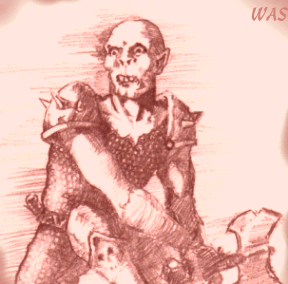RPGs:
The
Racism of Fantasy Online
The common stereotypes are not found in greater abundance anywhere than in RPGs, or
role-playing games. These are games played either online or actually in person
with charts and dice and such, where persons can create a character, choose a
race, an occupation (commonly referred to as the character's "class"), etc.
They then pretend to be this character and go on “grand adventures.” When one
examines the use of race in these games, the inherent racism of the fantasy
genre becomes even more apparent. Here is a list of the statistics for the
different races available in Carrion Fields, an RPG played online:
|
Human The standard race. Average stats,
gains levels fast.
Elf Very smart & quick, but frail.
Always good. Costs 500 extra exp
Half-Elf Human/elf mix. Intelligent, fast,
and wise. Costs 100 extra exp.
Half-Drow Human/drow mix. Intelligent, fast,
and wise. Costs 100 extra exp.
Dark-Elf Evil elves, smart and quick. Costs
500 extra exp.
Storm Giant Good giants, Strong, smartest of
Giants. Costs 500 extra exp.
Cloud Giant Neutral giants that fly, Strong and
Stout. Costs 500 extra exp.
Fire Giant Evil giants. Very strong, stout,
very dumb. Costs 500 extra exp.
Arial Agile bird-like creatures that fly,
smart. Costs 250 extra exp.
Felar Modified cats, agile and tough but
weakened. Costs 250 extra exp.
Dwarf Healthy little folk, but not too
nimble. Costs 250 extra exp.
Duergar Evil Dwarves, more agile than their
cousins. Costs 250 extra exp.
Gnome Tough little creatures. Wisest race,
smart. Costs 300 extra exp.
Svirfnebli Deep gnomes, strong and very wise.
Costs 250 extra exp.
Wood-Elf Neutral elves, sturdier than their
cousins. Costs 400 extra exp.
Orc Evil, destructive, strong, but
cowardly. Costs 100 extra exp.
Minotaur Very rare, strong and cunning, and
fairly dumb. Costs 450 extra exp
(Carrion Fields)
|

|
This is just a general outline of
the most basic characteristics for each race that are available in this
particular game. It is immediately apparent that those races that are
considered to be “good” tend to be smarter and wiser. The more evil the race
“inherently” is, the less intelligent they are. However, there is always a
trade off. Fantasy would not work as a genre if the good guys has had all of
the power on their end and could easily over-power the dark enemy. Those
creatures that are considered “evil” are the stronger in body, though not in
mind.
While descriptions of
each race is laid out for the potential role-player in a set of help files
within the game, the attitudes that the gamer's personage is supposed to
maintain is considered common knowledge. The author of this work entered
into such an RPG, Carrion Fields to be precise, and asked on the "newbie
channel" how he should act. He was quickly bombarded with replies not only from
other newly created characters, but also from the Immortal (game designer,
director, and system runner) who was on duty. He received replies such as:
"If you don't know how an elf should act, you shouldn't be here..." "Go read
Tolkien..." and even one young player stated that "since you are playing an elf,
you are naturally smart, quick, and very good. So be nice to everyone but evil
chars." Well, how is one to know who is evil? By their race, of course.
Breaking out of the norm for a character’s species is discouraged to the point
of expulsion from the system. Each race has a specific skin color, or at least
a range of colors that it must be. This loyalty to one's race is sort of
reminiscent of the Aryan supremacists from WWII and the even older KKK. Each
race has its specific gifts. The arials and cloud giants can fly. Gnomes and
svirfnebli work well with the element of earth. All giants are, of course,
strong, while the elves—no matter good or evil, also called drow—are weak.
Specific descriptions are given as to the body structure, skin and hair color,
height, etc. The stereotypes are played to their maximum potential and all
archetypes are put into use...or else.
Not all stereotypes
are the universal, however. Elves, for instance, are in some cases tall, lithe,
and pure, while in other cases they are small, still very lithe, but very
mischievous. Halflings, also called hobbits by some, are always small and happy
folk who enjoy food and fun. Orcs are always evil and vicious, but their size
varies as does their courage. In some RPGs, orcs are the ultimate enemy,
because they are strong and smart, while in others they are the lowest figures
because they are weak when alone and not smart enough to accomplish anything
without direction. However, even though the race may be altered slightly, it is
never drastically changed. Elves, even when mischievous, tend to be good while
orcs, no matter how smart or brave, are always evil.
Return to page 1:
Essay
Continue to page 3:
Other Theories
XX************************************************************XX
